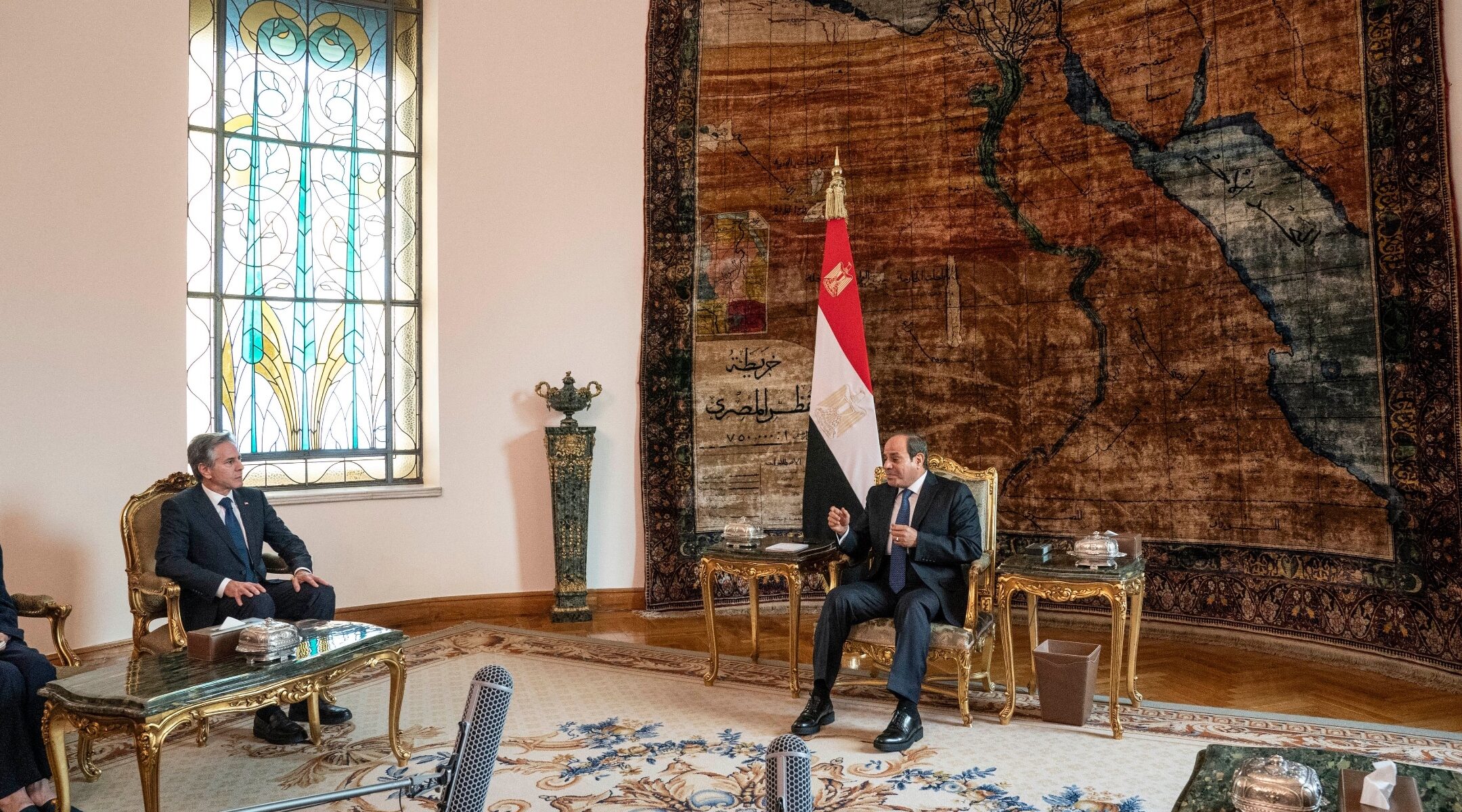WASHINGTON (JTA) — In a meeting with Secretary of State Antony Blinken, Egyptian President Abdel Fattah al-Sisi mentioned Blinken’s Jewish identity, and made a false and curious claim.
“Mr. Secretary, you spoke about the crisis and you spoke as a Jewish person, and let me tell you that I am an Egyptian citizen, and I was born and brought up in a neighborhood where we had Jewish neighbors,” Sisi told Blinken, who was in Cairo Sunday to drum up support for Israel’s war against Hamas. “And Jews who used to live here in Egypt [had] not ever suffered from oppression and persecution… As a matter of fact, the Jews were never targeted … throughout the whole history. ”
Sisi, who is an ally of the United States and is friendly with Israel, has nurtured what’s left of the Jewish community in his country. But Egypt’s treatment of its Jewish population in modern times is replete with repression, discrimination and at times bloody violence — especially during and after Israel’s establishment. From a community of 80,000 in 1947, Egypt’s Jewish population now counts in the single digits.
Anyone familiar with the Bible and the Passover story, of course, can point to a far more ancient history of Jews being oppressed in Egypt — and that’s what Sisi may have been referencing in his comment. Modern Egyptians take umbrage at the tale of the Exodus, which recounts the tribulations of Jews as slaves in Egypt.
There is no archaeological or historical record of Israelites being in Egypt, as slaves or otherwise. Historians have said that the biblical story of Joseph and his brothers building an Israelite presence in Egypt may have origins in the reign of the Hyksos, a group of Canaanite tribes.
It’s a sensitive issue for Egyptians: In 1977, as the leaders of Israel and Egypt launched the history-changing talks that led to the Camp David Accords, which have endured decades later, Israeli Prime Minister Menachem Begin joked that he looked forward to seeing the pyramids because “after all, we helped to build them.”
A top aide had pleaded with Begin not to make any reference to the pyramids, and his warning proved prescient: there was a flurry of aggrieved articles in the Egyptian press.
The pyramid myth has its modern origins in the hugely popular 1956 film “The Ten Commandments”, which depicts the Hebrew slaves laboring on the pyramids until they are redeemed by Moses, played by Charlton Heston.
Exodus describes the Hebrew slaves as working in construction, but does not mention the pyramids. As Rabbi Mordechai Becher pointed out last year on the website of the Orthodox organization Aish, the pyramids were built long before the children of Israel were purported to have been in Egypt. “Sorry to disappoint, but it was indeed aliens,” Becher joked in an account of his visit to Cairo.
Still, the myth continues to sting: As recently as 2010, Egyptian archaeologists were at pains to point out that discoveries showed that the people who built the pyramids were paid for their efforts.
More recently, the Jews of Egypt have had a painful, and documented, history: In its first stages of modernization, under the Muhammad Ali Dynasty in the 19th century, Egyptian authorities introduced laws discriminating against Jews. A sequence of laws in the 20th century disenfranchised the vast majority of Jews in the country.
Those laws and a series of bloody and deadly pogroms drove the Egyptian Jewish community to flee, depleting it to its current tiny size.
Blinken, who has noted his Jewish roots and the persecutions of his extended family to explain his commitment to Israel and to human rights, did not take Sisi’s bait. Hamas’ savage murder of more than a thousand people is what was moving him in this instance, Blinken said.
“I come first and foremost as a human being,” he said. “A human being like so many others appalled at the atrocities committed by Hamas.”
JTA has documented Jewish history in real-time for over a century. Keep our journalism strong by joining us in supporting independent, award-winning reporting.






